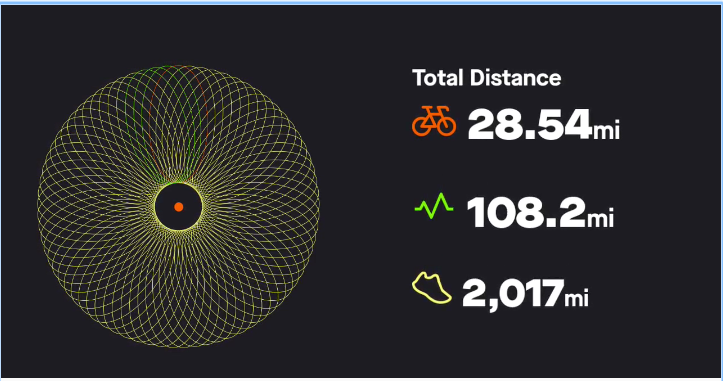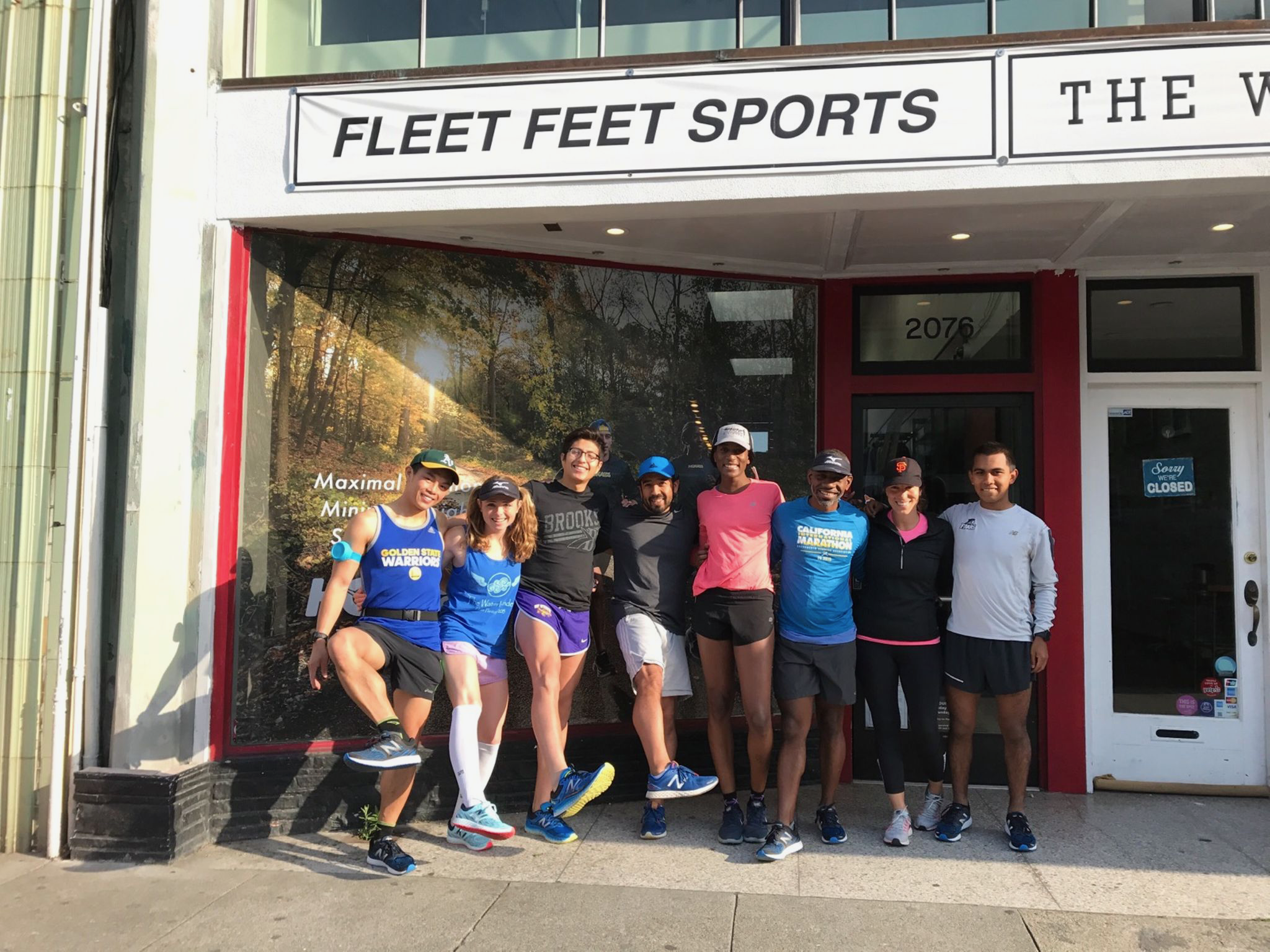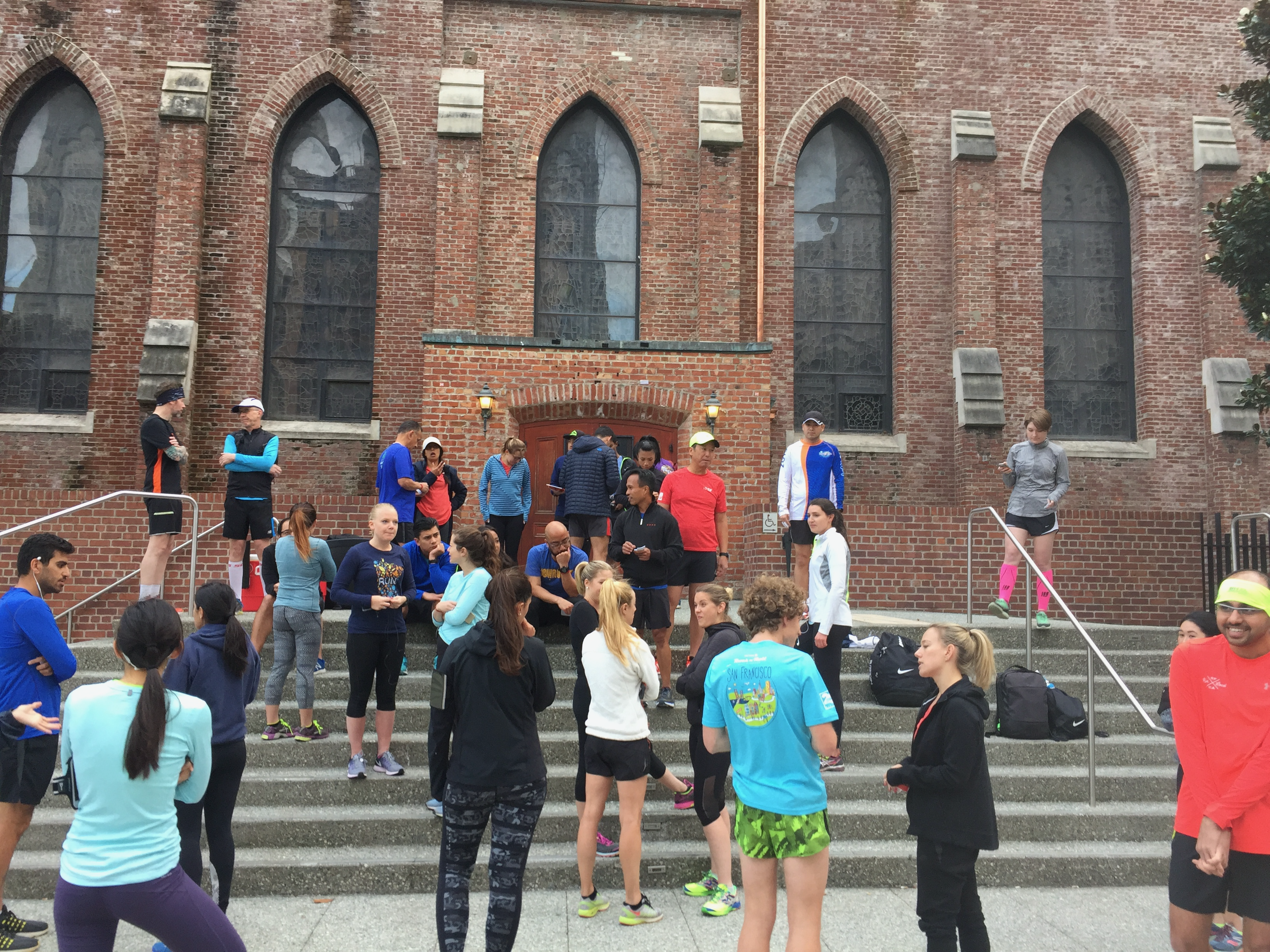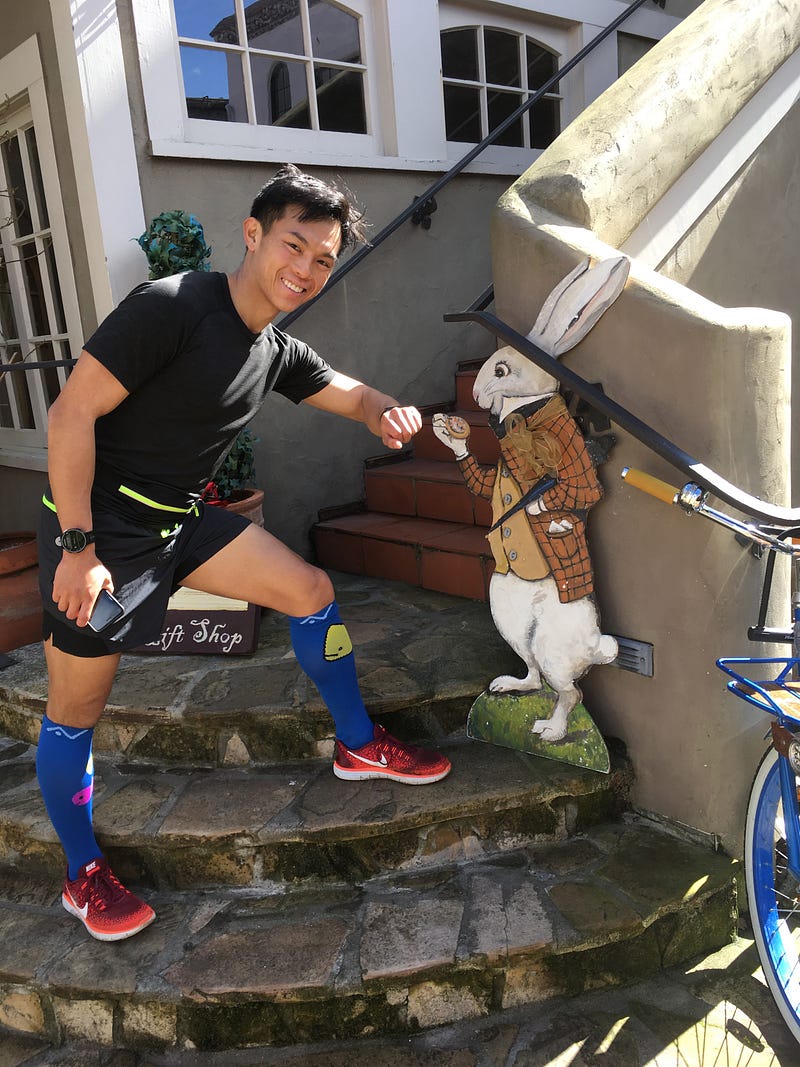17 thoughts on running, startups, and life while running 2017 miles in 2017
 Screenshot via Strava Year in
Sport.
I think most of the squiggly 108.2 “other” miles are from hiking.
Screenshot via Strava Year in
Sport.
I think most of the squiggly 108.2 “other” miles are from hiking.
I ran, a lot, this year— 2017 miles over 280 hours, or just short of 12 full days. For many of you, that seems like a ridiculous amount of distance and time, but to put it in perspective, elite marathoners and ultrarunners easily run two or three times that distance in a year. While I’m proud of accomplishing the goal I set for myself, the miles are just a number— once you do something that much, people usually like to say “X is your life”. That’s partially true— it takes up a lot of your life, but more importantly, you start to see lots of analogies for life in it. Running has given me both more meaning in life as well as more time to reflect upon it. Here are 17 ruminations from those runs.
1) At mile 0.2 of every marathon: “26 miles to go! Oh wow, 26 miles is long way to DRIVE. Like seriously, if I open Google Maps and it says ‘26 miles’, I’m like, ‘That’s faaar.’ What am I doing with my life?”
2) Friends often ask questions like, “If you’ve run a marathon, is a 5k/10k/half marathon easy for you?” When I first started running in high school, I asked Ken, the captain of our cross-country team, “How long did you have to run for before running felt easy?” I’ll never forget his response:“It should never feel EASY. You put in the same effort, and you just get FASTER. It doesn’t get easier.” I’ve found that the same advice applies to startups and lots of other things in life — it never really “gets easier” and you never really “make it.” Your skill, leverage, and impact just hopefully increase, and you can learn to work/train smarter and avoid past mistakes, but it shouldn’t ever really feel easy.If it does, maybe it’s time to find a new challenge.

Somewhere in San Vito Lo Capo, Italy, September 2016, PC: Sarah Staatz
3) It’s really true what they say— “life/love/building a company/pretty much anything worthwhile is a marathon, not a sprint”. Be careful if you find yourself just trying to “hang on” until you “make it” because things usually take longer than you expect, something generally goes wrong, and the finish line might be further than you expected.
4) Marathons require not only physical and mental endurance, but emotional endurance as well. They say life is a marathon, but the inverse is true too: a marathon is in some ways the perfect microcosm for life— you experience all the ups and downs and the full range of emotions: anxiety, fear, doubt, joy, energy, enthusiasm, more anxiety and doubt, and finally a sense of accomplishment and relief. And if you’re hungry for more, or perhaps slightly sadistic, you sign up to repeat the whole process.
5) No matter how long you’ve been doing something, whether it’s running, coding, shooting a basketball, or getting to know someone you already know really well even better, it never hurts to get back to basics. Focus on the fundamentals. Both knowledge and skill are trees — there’s infinite room to branch out and you never stop growing, but all growth is for naught if you don’t have a solid trunk and solid roots in the ground.

Group run with Fleet Feet SF!
6) When you come across another runner, all you know is how fast they happen to be running at one moment in time. You don’t know whether they’re on mile two or twenty, whether they have a mile or ten left, how fast they ran before or how fast they will run after. I’ve definitely noticed that guys running alone especially tend to speed up when they run by people… and I might be guilty of this myself sometimes 🙈. Similarly in life, you only see what someone says or does in an instant— understand that everyone’s starting from different places, whether they’re “ahead” or “behind” you, and everyone’s fighting their own battles. Hell, in life, someone might have had to run a marathon just to toe the starting line next to you.
7) Building on the previous point, you should always compete against yourself, and only yourself, to be the best you can be. Sure, you should draw inspiration and learn from others, even compete against them at times, but external motivation comes and goes, there’s lots of luck and variance involved, and everyone has different goals.
8) It follows that anyone that takes shortcuts or cheats is only cheating themselves (although I’m a big fan of the CSI techniques used to catch cheaters over at Marathon Investigation). Don’t take shortcuts, and don’t waste too much time looking for them.
9) Only you really know where your own finish line lies. Don’t let others set goals for you. I know lots of runners, myself included, pressure people who are just getting started to sign up for a 5k, 10k or a half-marathon— “It’ll be fun!” In startups, life and love, you’ll also have no shortage of people who try to set your goals, but you know what’s best for you right now.

WeRunSF led by the incomparable Super Sam!
10) No matter what your goal is, the hardest step is the first one getting out the door, so just get started— type that first line of code, write that first sentence, strum that first chord, or learn how to say “Hola”, and don’t worry too much about what’s next. You’ll figure it out.
11) I know “take it one step at a time” is super cliché, but like any worthwhile challenge or problem, decomposition is your friend. Don’t think of it as a marathon, but a pair of 10-milers and a 10K—those are runs you’ve done before and know you can do again. Even taking a goal like 2017 miles in a year and breaking it down to 5.5 miles a day makes it not sound so bad. Most hard problems can be broken down into a series of less difficult problems, including ones that you know you can tackle from experience if you focus on what you know how to do and forget about the scary unknowns. That will build confidence, and armed with that and one less thing to do for your previously Herculean task, you just may surprise yourself.
12) Miles are just miles, time is just seconds and days.We assign meaning to every minute and every mile. Choose to spend your time with people, trails and things that give your life meaning. This year I was tremendously fortunate to run many miles with great company including over 176 hours with Sarah, 25 hours with Andrew, and many great hours with friends and amazing run groups like Sports Basement SF, WeRunSF, DSE, and Fleet Feet SF. I ran all over the place: up and down California, Utah, Oregon, Washington, and even Thailand. I also helped Sarah train for her Boston qualifying marathon, which was much more rewarding and challenging in different ways than when I trained to qualify myself last year. Those people and places gave the miles meaning.

Miles are just miles, time is just seconds and days. We assign meaning to every minute and every mile. PC: Sarah Staatz
13) But no matter what, like many things in life, you can’t always only do things with great company or share every experience with someone. You have to learn to love doing whatever you love to do in solitude as well. Solo runs are where I did my best thinking. Friends and training partners are amazing and can help hold you accountable, but they can’t be there for every 6am run— you have to find the motivation within yourself as well.
14) One way to help yourself is to build habits. The good and bad thing about habits is that they’re hard to break. So start healthy habits, but don’t be a prisoner to them. Habits and training plans are useful tools, but it’s okay if you miss a day here or there.
15) Speaking of habits, our brains and bodies are pretty amazing at adapting. You do something enough and you start to feel like you can do it in your sleep. It can be tempting, and sometimes even an needed break to zone out and do things on autopilot or “just get this Friday 5-miler over with.” But if you live life on autopilot, you may miss out on that breathtaking sunset on a mundane Monday. In the grand scheme of things, we only have so many Mondays. It’s up to us to make the mundane magical.
16) I didn’t think I could pack so many clichés into this list, but it holds true; it really is all about the journey, not the destination. Most runs, you’re either running a loop or turning around somewhere and running back to where you started, so it can’t just be about the destination.
17) People often ask why I run so much. Sometimes I tell them it’s a great way to relieve stress, or that it helps me organize my thoughts. Both are true, but to be honest, sometimes I’m not sure. I enjoy it, and that’s reason enough for now. Would I be happy running less? Or more? I’m not sure. I’ll think about it some more…be right back — I already know where to go to do my best thinking.

Okay, I lied. This is the real reason I run. PC: Sarah Staatz
Thanks so much for reading! If you enjoyed reading this, please applaud it on Medium and share it with anyone that you think may also enjoy it!
And if you’re around SF, let’s go for a run! Find me on Strava!
Thanks to Sarah Staatz and Ricky Yean for reading drafts of this.
Thanks for reading!
If you enjoyed this post, check out my latest post: Burnout and Basketball Dynasties:
An exploration of burnout, personal growth, and how lessons from the Golden State Warriors dynasty relate to long-term goals in life.
Read more →
Or subscribe to get notified of new posts: